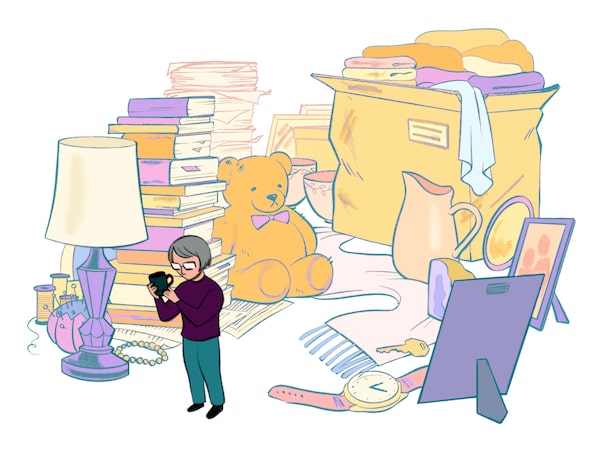First Person is a daily personal piece submitted by readers. Have a story to tell? See our guidelines at tgam.ca/essayguide.

Illustration by Alex Siklos
I am awash in books and stuff and a cacophony of memories, some surfacing from under decades of my bulwarked life. Once again, John is away, and instead of cleaning up my desk, as was my wont on his annual trip, it is now my house I am trying to throttle into place. The children (except a particularly special one) are now grown and gone, leaving too many things behind. And now I am trying to make some sense and order of it all. Downsizing. Contracting after years of expanding, collecting and creating a life. In trying to figure out what stays and what goes. I find myself trying to figure out the measurement of things. Trying to create guideposts to show me the how and why of this endeavour. It isn’t easy. Many of the objects connect me to people who deeply touched my life and I will never see again. These mementos are the ties that bind – ethereal umbilical cords through which I send thoughts and love each time I see them. How do I let those go without abandoning that love?
So I start with the books, the easiest, no? Until I realize how curated they have unwittingly become, reflecting our interests and travels throughout our lifetime together. Their presence and display are anchors to a past and the attendant emotional attachments (his collection of poetry and mystery books; the classics which he swears he wants to read again … ). Many are redistributed to a “not yet” pile. Too many. I try to check myself; if I haven’t read it in the last 15 years, will I really read it in the years I have left? Get some perspective, I tell myself. I could have a stroke tomorrow – start weeding!
And then there are the kids’ books, many inscribed with their names and gifting dates. Long forgotten and some never read (I know!). Do I rip the front page off? Do I save it for them – to burden their future some day with discarding it?
Our house is replete with meaning. Each rug, painting and artifact from a special place and time. An accumulation of lives well lived. A few years back my second daughter went through the house and told me which of the furniture she wants when we are gone. She was forceful and deliberate, if not a bit morbid. But she now has children of her own and is filling her house with her own meaning, with little space for anything else.
So what do I do with my mother’s wedding dress from 1947? Or the box of her childhood scrapbooks and mementos that somehow landed in our basement decades ago? Or, for that matter, my wedding dress, and those of my daughters, taking up emotional space in a closet upstairs? Or the children’s toys I thought they would love to have for their own children, some of whom are already in their teens. All for the sake of the memories. Mine and theirs. Or so I thought.
Through all of this, I am coming to realize that the things we collect ultimately have little meaning to others, as much as we may want them to. Instead, they are a form of curating our own memories. Our bulwark.
This becomes more complex when I hear my adult children retell stories of their childhood that are remarkably different from my memory. Their stories sometimes include perceptions of the “story behind the story,” e.g. what Mom/Dad was going through or feeling at the time – projecting motives that may never have existed, but somehow serve a purpose.
Is memory always a matter of perception followed by interpretation? As we continue to age, my five siblings and I, most of us now in our 70s, find ourselves challenging each other on the memories of our childhood and parents – often proving who has it right by unearthing some form of evidence, in an attempt to turn memories into facts. As each of us rediscovers and shares mementos and photos from our parents, I suspect we are still trying to ferret out who they were and who we were to them.
And finally, I face the myriad papers and files documenting the building of a profession. The impulse to simply let it all go collides with the ambition to save, record and archive. For years my identity was in my work and my contributions made a difference. In the wave of my life, it was a most fulfilling time. I have saved the proof of it all, but wonder its true worth. Yes, it is of historical interest, but will the keeping or telling of it be relevant in a future when few will care? Because they, like I was, will be caught up and making a difference in a wave of their own.
Making a difference in a profession, in a life, is taking things in hand as they are and moving forward. Things as they are is an accumulation of all that is past. All those past waves, now indistinguishable, that make up the sea.
Bridget Lynch lives in Toronto.